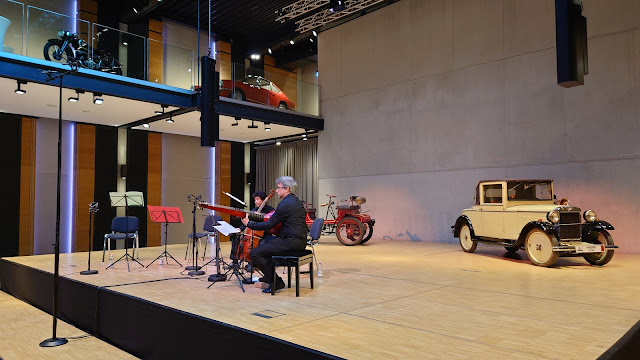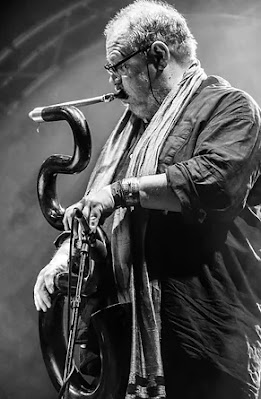 |
| Atsushi Sakai (viola da gamba) and Bruno Helstroffer (theorbo) at PS.Halle, Einbeck |
Light the earth: Incantation: Handel, Jean de la Fontaine, Michel Lambert, Sieur de Saint Colombe, Marin Marais, Michel Godard; Michel Godard, Antje Rux, Airelle Besson, Atsushi Sakai, Bruno Helstroffer; Internationale Händel Festspiele Göttingen at PS. Halle, Einbeck
Reviewed 14 May 2024
The somewhat unlikely combination of voice, serpent, theorbo, viola da gamba and jazz trumpet in a programme moving between French Baroque, Handel and contemporary
The serpent is a bass instrument of somewhat uncertain origins that acted as wind bass line in ensembles from 17th to early 19th century Related to the cornett, it is a wooden instrument covered in leather with a brass mouthpiece, pitch altered using finger-holes. The sound is described as being somewhere between a bassoon and a euphonium, but hearing one played for the first time earlier this week, my first naughty thought was how much the sound evoked my Dad playing tunes on random bits of tubing and hosepipes.
 |
| Michel Godard and serpent |
On 14 May 2024, French multi-instrumentalist Michel Godard brought his serpent to the Internationale Händel Festspiele Göttingen. At PS. Halle, Einbeck, Godard was joined by Antje Rux (soprano), Airelle Besson (jazz trumpet), Atsushi Sakai (viola da gamba) and Bruno Helstroffer (theorbo) for a programme entitled Light the earth: Incantation with music by Handel, Jean de la Fontaine, Michel Lambert, Sieur de Saint Colombe, Marin Marais and Michel Godard.
The venue was the event hall at PS. Speicher, a museum containing Europe’s largest collection of old cars, motorbikes and commercial vehicles. So the concert took place against a backdrop of classic, veteran and vintage vehicles, many, like the serpent itself, rather wonderful but tricky to ‘drive’. PS. Speicher is based in Einbeck, a town also notable for its timber framed houses (Fachwerkhäuser) dating from 16th to 20th centuries.
At first sight, Michel Godard’s ensemble seemed somewhat oddly matched, a modern type of broken consort, perhaps. But what all the instrumentalists had in common was a feel for improvisation, so viola da gamba player Atsushi Sakai could move between poised 17th-century divisions and playing his instrument like a jazz bass.
Anchoring this was Antje Rux’s pure, clear soprano, bringing a line of clarity to the music around which the others moved. Godard ran the ensemble much like a jazz group, in each piece the original formed the basis and repeats would allow different members of the ensemble their own solo riff.
With two halves of some 40 minutes each, and a similar approach with each piece, the result was perhaps a programme slightly too long and occasionally the improvisatory sections felt a little unfocused, as if the players had not had time to bed in. But what really came over was the musicians’ delight in making music together and combining such disparate sounds with a little bit of magic.
We began with Sieur de sainte Colombe’s Prelude pour viol from just viola da gamba and theorbo, haunting and with an improvisatory freedom. Thereafter the programme alternated Godard’s own music, Michel Lambert and Handel, ending with Marais and Jean de la Fontaine.
Godard’s song A trace of grace (setting words by Linda Bsiri) gave us our first experience of Godard’s serpent, a veiled, brass-like sound with a certain unfocused feel. The song had a modern, ballad-like feel with poised singing from Rux, and at one point Godard and Rux were in octaves, the instrument shadowing the voice. But the song was only the starting point for a series of free variants, each performer having fun.
Michel Lambert’s Vos mepris chaque jour began as a gently haunting piece for theorbo, before a more formal dance with viola da gamba and serpent, an unlikely but effective combination, there was a sense of Godard pushing the serpent to the limit, particularly in the freer sections. Rux’s stylish contribution was complemented by Besson’s free trumpet solo.
Godard’s instrumental piece, Sulla scala delle sfere began with rather Eastern-sounding influences before freer improvisation too over with Godard producing some amazing farty low notes. The first half ended with a poised account of Peaceful rest from Handel’s Hercules with Rux pure and clear in the solo, then Godard took over the melody leading to a series of free variations on Handel’s original, ending with Rux’s solo, but this time with Godard providing a counter-melody, the two timbres contrasting.
Part two began with more Handel, Piangero from Giulio Cesare. Again a thoughtful account from Rux with Godard providing a bassoon-like counter-melody before others took up the challenge. Godard’s Light the Earth provided material for an extended sequence where each instrument had its moment in the spotlight, Handel returned with Ferma l’ali from Le Resurrezione, not a well-known piece but fertile ground for the group’s improvisation and reinvention.
We ended with a quite straight account of Marin Marais’ Prelude sur les folies de’Espagne followed by Jean de la Fontaine’s Couplets Pour Mme D’Hervart Sur l’air Des Folies D’Espagne, a delightful song that moved from Rux’s solo to a trumpet and serpent duet to further solo couplets from Rux with improvised counter-melodies from serpent and trumpet.
The result was a somewhat unlikely but engaging evening, made all the more effective by the way all the instrumentalists moved between freedom and rigour, yet always treating the music with respect. There were perhaps one or two too many numbers with conveniently repeating ground-bass-like accompaniments but one could not but admire the imagination and the colourful timbres on offer.
Never miss out on future posts by following us
The blog is free, but I’d be delighted if you were to show your appreciation by buying me a coffee.
Elsewhere on this blog
- International Handel Festival, Göttingen
- Göttingen 1853: Johannes Brahms & Joseph Joachim, a meeting of musical minds evoked – concert review
- Quite a Summer: Tom Fetherstonhaugh and Fantasia Orchestra have three festival debuts including the BBC Proms – interview
- Dresden Music Festival
- The results were indeed glorious: Klaus Mäkelä and the Royal Concertgebouw Orchestra in Bruckner – concert review
- The journey continues: Dresden’s historically informed Ring returns with a revelatory Die Walküre – opera review
- Mozart in 1774: Samantha Clarke, Jane Gower, The Mozartists, and Ian Page on stylish form at Wigmore Hall – interview
- Vigour, energy & joy: A Choral Celebration of Queen Mary II from choirs of Royal Hospital Chelsea & Old Royal Naval College – concert review
- A neglected gem revived: New Sussex Opera in Lampe’s The Dragon of Wantley combining historic style and 1980s politics – opera review
- Lobesgesang: Mendelssohn’s rarely performed symphony-cantata is a fine climax to Sir Andras Schiff and the OAE’s exploration of the composer’s symphonic music – concert review
- Fear no more: Brindley Sherratt on releasing his first recital disc – interview
- A German in Venice: Schütz alongside music he could have heard in Venice, a wonderfully life-affirming disc – record review
- Attention must be paid: the Engegård Quartet at Conway Hall in Mozart, Bartok, Maja Ratkje, and Fanny Mendelssohn – concert review
- Opera as it ought to be: Mozart’s Don Giovanni from Hurn Court Opera reviewed by James McConnachie – opera review
- Home







.jpg?w=160&resize=160,160&ssl=1)
